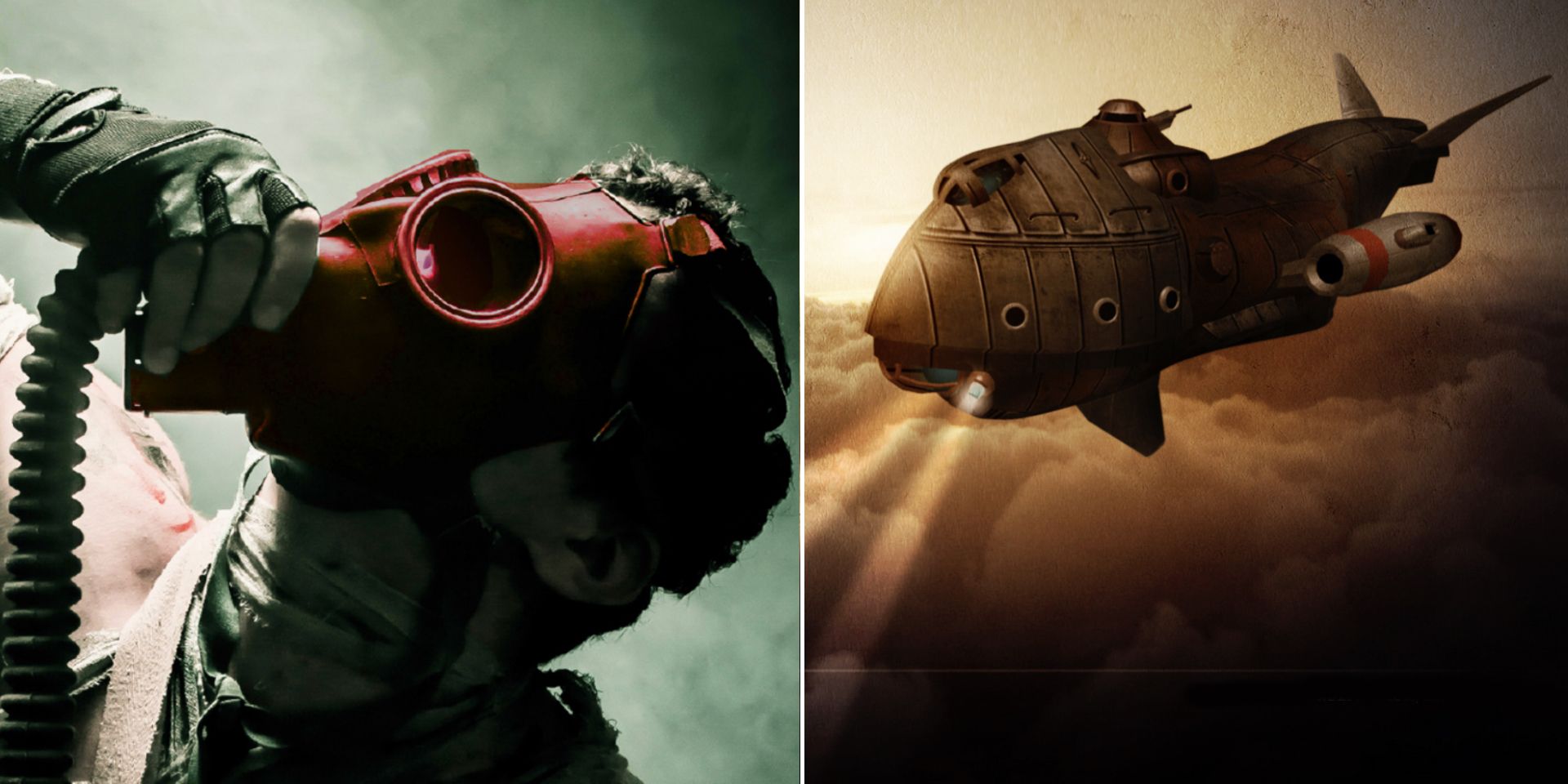
Roleplaying games like Dungeons & Dragons are famous for putting a lot of work on their Dungeon Masters and GMs, who have to create and bring characters and worlds to life through a mix of advance preparation and frantic improvisation. The tabletop RPGs in this list, however, defy this trend through rules and content that cut down on game masters' prep work, encouraging players to take up the responsibilities of world-building. In short, these low-prep RPGs are great for "one-shot" or "pickup"-style RPGs thrown together on short notice.
When it comes to tabletop roleplaying games, there are two schools of game master philosophy. One school emphasizes the virtues of preparation, holding that a Dungeon Master/game master/storyteller should write up materials to describe as many aspects of their game's world as possible, just in case the players ask about it during the game. This preparation process might involve drawing up a map of the world, a roster of NPCs with carefully constructed personalities, a history of local geopolitical relationships, a creation myth, and, of course, antagonists with minions, monsters and sinister plans.
The other school of thought idealizes the art of improvisation: Players will always do something the game master hasn't prepared for, an adherent of this philosophy might say, so why not just roll with the punches and make stuff up on the fly? Truthfully, though, these "Preparation" and "Improvisation" schools aren't contradictory and, in fact, work best when used in tandem. By preparing useful narrative details ahead of time, an Improviser can more easily construct new plots on the fly. Similarly, a knack for improvisation can help a prep-heavy game master adapt their pre-written content to the needs and interests of their players, as these fun Tabletop RPGs demonstrate.
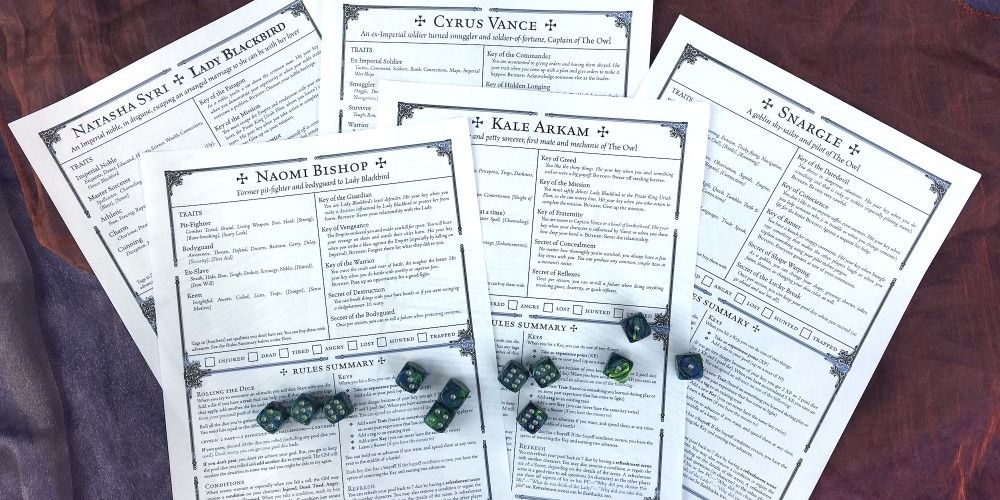
The roleplaying game Lady Blackbird: Adventures In The Wild Blue Yonder - created by John Harper, designer of narrative games like Blades In The Dark - is a prep-free, romantic science-fantasy game with swashbuckling, sky-ships, wizards, rebels, pirate kings, and (potentially) true love. This 16-page, experimental RPG contains a wide range of pre-written characters for players, such as runaway noble Natasha Syri and Snargle the Goblin. It also contains a pre-written scenario that players can dive right into: In the world of the Wild Blue, a floating expanse of cloud and air surrounding a magical star, the crew of the sky-ship Owl must escape the clutches of the Imperial Navy and reunite their client, the titular Lady Blackbird, with her estranged lover, the infamous Pirate King Uriah Flint.
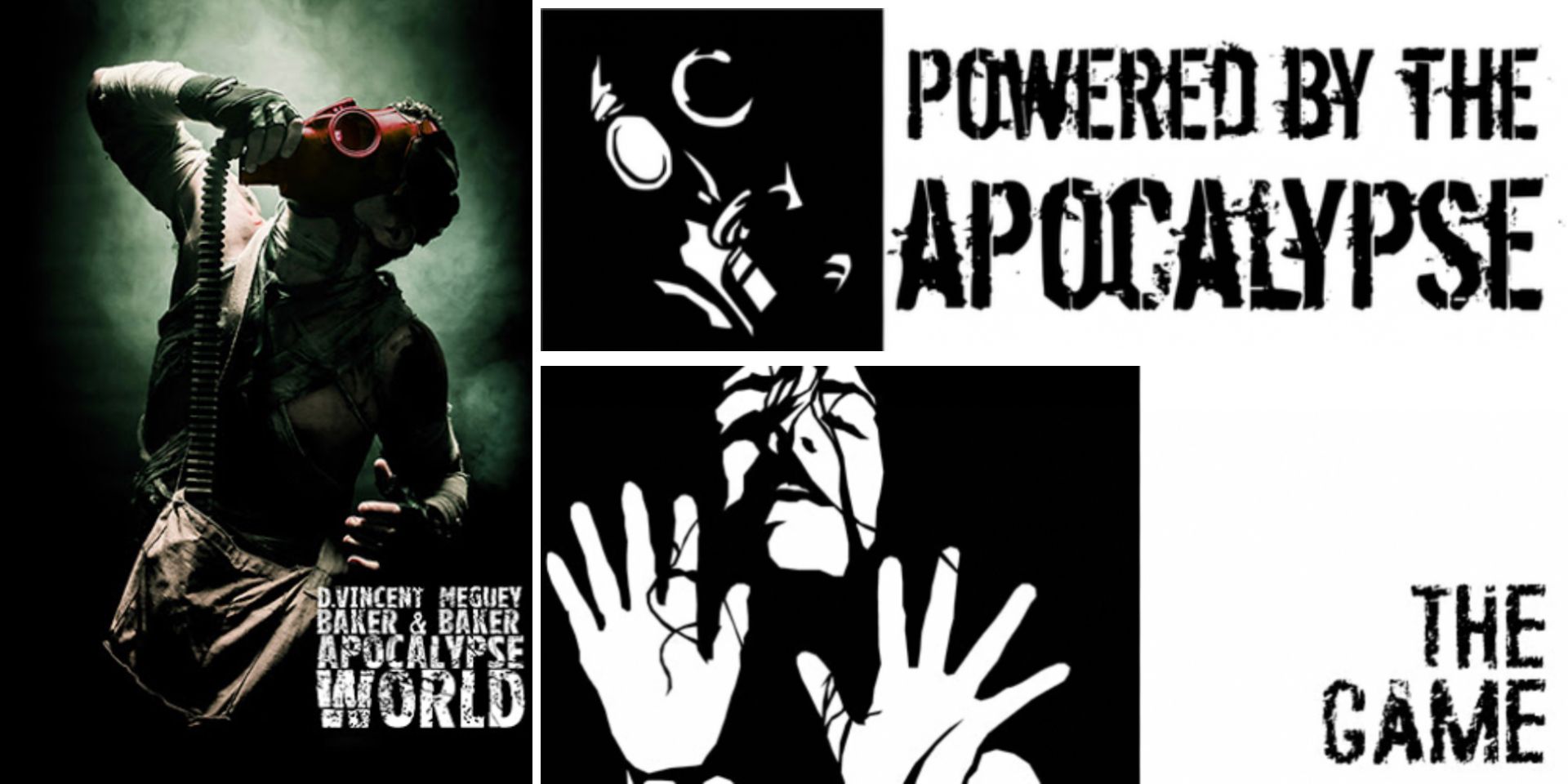
The core philosophy behind the many Powered by the Apocalypse roleplaying games is that players should always try to "Play to find out what happens next." Nowhere is this philosophy more soundly expressed than in Apocalypse World, the first of the PbtA games, which has dice-rolling rules, "Playbook" character sheets, and storytelling principles designed to help both the players and the "Master of Ceremonies" improvise stories of a post-apocalyptic world in a natural way.
"Moves" in Apocalypse World (and games like Dungeon World or Monster Of the Week) are always triggered by narrative decisions players makes, and the outcome of the dice roll always creates a new plot thread to follow. Furthermore, the abilities listed in certain Playbooks are designed to both solve problems and generate conflict: The "Hardholder" Playbook gives its character a small stronghold they must protect and expand, while the "Battlebabe" Playbook's charismatic abilities can both magnetize NPCs and trigger the outbreak of conflict.
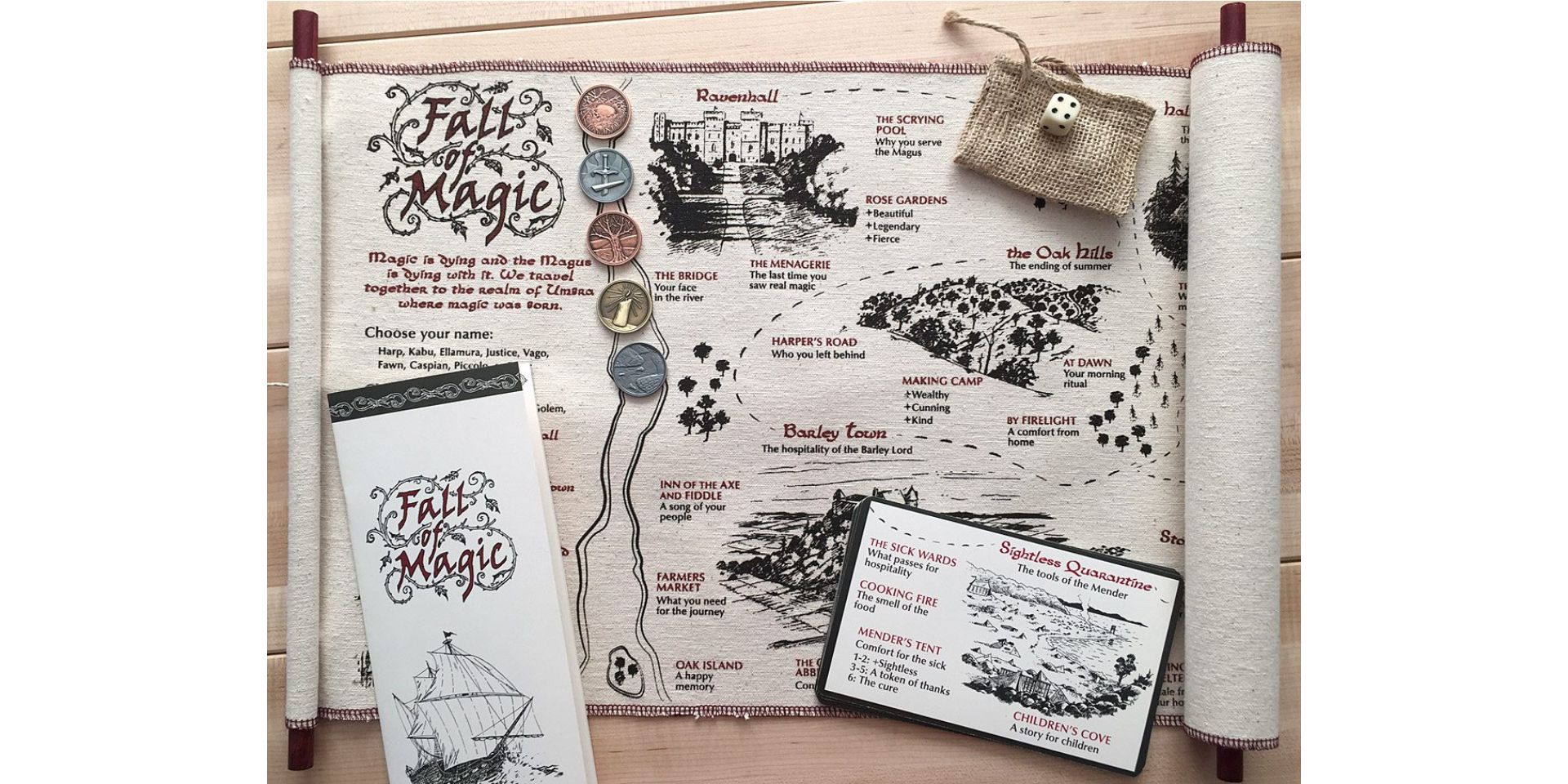
Some game masters like to create or buy props players can handle during their games for extra fantasy verisimilitude; the Fall Of Magic storytelling game embraces the use of props to the point of blurring the lines between tabletop RPG and board game. Aside from its slender rulebook, Fall of Magic consists of a pouch of metal coins, a small deck of cards, a single six-sided die, and a long scroll painted with an elaborate map of a fantasy land. In a world where magic is dying, players take on the role of traveling companions to the Magus, a spellcaster who's embarked on a journey to the realm of Umbra, where magic is born.
As the players navigate from one end of the map to the other, they can choose different travel routes, roll their dice to overcome challenges inscribed on the map, and use text prompts on the map to weave powerful, poignant scenes of drama and adventure that vary each playthrough. Players who can't afford the physical copy of Fall Of Magic can purchase a digital version on the Roll20 website, which includes a digital version of the map, tokens, and story cards.
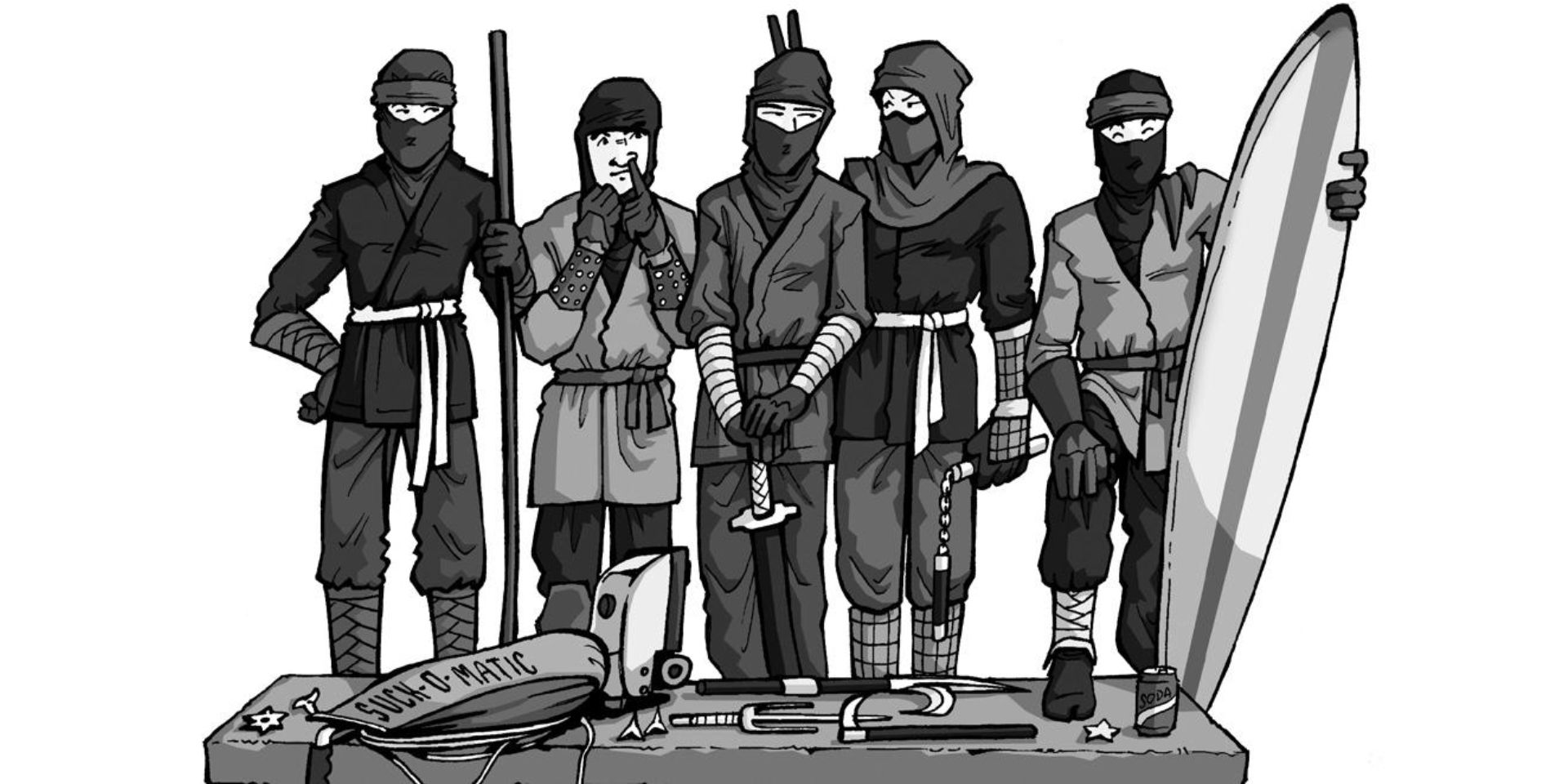
What if there was a global fast-food franchise staffed entirely by ninjas? And what if those ninjas had to deliver food to their customers in 30 minutes or disembowel themselves as penance for their failure? This is the basic principle behind Ninja Burger 2nd Edition, a zany tabletop RPG inspired by cheesy 1980s Ninja action movies, Saturday-morning kid shows, and every trope about ninjas out there. The rules for character creation are simple but flexible compared to games like Dungeons & Dragons, letting both players and "The Dispatcher" quickly throw together ninja-themed characters with roles such as Chef, Driver, and "Deliverator."
The book also includes a set of pre-made obstacles that can stand in the way of a ninja team's quest to deliver food (unseen and unheard) to their customers, along with a series of antagonists and rivals in the culinary industry. For instance, there's the rowdy rogues of Pirate Pizza ("We Don't Make Pizza, We Just Deliver It") and the ruthless raiders at Burger ViKing ("Have it our way, or else"). A game of Ninja Burger works best when players don't take things too seriously, and the Dispatcher doesn't let notions like the laws of physics get in the away of telling a fun story.
from ScreenRant - Feed https://ift.tt/3nvGPh4

0 Comments